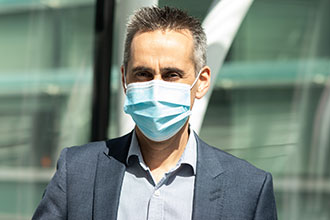The importance of patient engagement in basic science research

By Olivia Lavery

Dr. Andrew Advani
Patient engagement in basic science health research is a long game.
Though the end goal might be a cure, early stage lab research investigates the fundamentals that may unlock future treatment. No matter how long the game may be, patient engagement can always offer a valuable perspective.
Dr. Andrew Advani, an endocrinologist and scientist in the Keenan Research Centre for Biomedical Science, says one tactic for bettering patient understanding of early-stage lab research and its impact is to highlight examples of seemingly abstract basic research that have had major health implications.
“For instance, Dr. Mary-Claire King discovered the BRCA1 mutation responsible for many cases of breast cancer,” he says. “This took years of painstaking work without evidence of immediate return on investment, but that fundamental discovery has now saved the lives of thousands of women.”
Dr. Advani has spent his career studying diabetes, and in particular complications of diabetes involving the kidneys.
As a physician, he has long understood the importance of engaging patients in research and care. It helps patients understand the work being done to improve their lived experiences, and it also promotes essential skills for researchers.
“Collaborating with patients helps research teams understand why they do the research they do, it gives our research context, and it encourages wise stewardship of funds,” Dr. Advani says. “It also helps trainees learn the importance of communicating their research to a non-research audience and how to do that.”
Patient partners have helped Dr. Advani and his collaborators study the impact of gender on the experiences of young adults with Type 1 diabetes and explore patterns of recreational cannabis use in young adults living with Type 1 diabetes.
Patient engagement for Dr. Advani and his lab team has taken many forms: from annual meetings with patient groups, to accessible educational videos, lab tours, and presentations to national charities.
Dr. Advani and his team even set up an Instagram account to connect with patients during the COVID-19 pandemic. The page is used to share research updates, raise awareness, and profile diabetes care team members so that patients can still know they are connected.
“Working with patients helps to identify questions that are particularly important to our most important stakeholders – the patients themselves.”
About St. Michael’s Hospital
St. Michael’s Hospital provides compassionate care to all who enter its doors. The hospital also provides outstanding medical education to future health care professionals in more than 27 academic disciplines. Critical care and trauma, heart disease, neurosurgery, diabetes, cancer care, care of the homeless and global health are among the Hospital’s recognized areas of expertise. Through the Keenan Research Centre and the Li Ka Shing International Healthcare Education Centre, which make up the Li Ka Shing Knowledge Institute, research and education at St. Michael’s Hospital are recognized and make an impact around the world. Founded in 1892, the hospital is fully affiliated with the University of Toronto.
About Unity Health Toronto
Unity Health Toronto, comprised of Providence Healthcare, St. Joseph’s Health Centre and St. Michael’s Hospital, works to advance the health of everyone in our urban communities and beyond. Our health network serves patients, residents and clients across the full spectrum of care, spanning primary care, secondary community care, tertiary and quaternary care services to post-acute through rehabilitation, palliative care and long-term care, while investing in world-class research and education. For more information, visit www.unityhealth.to.
